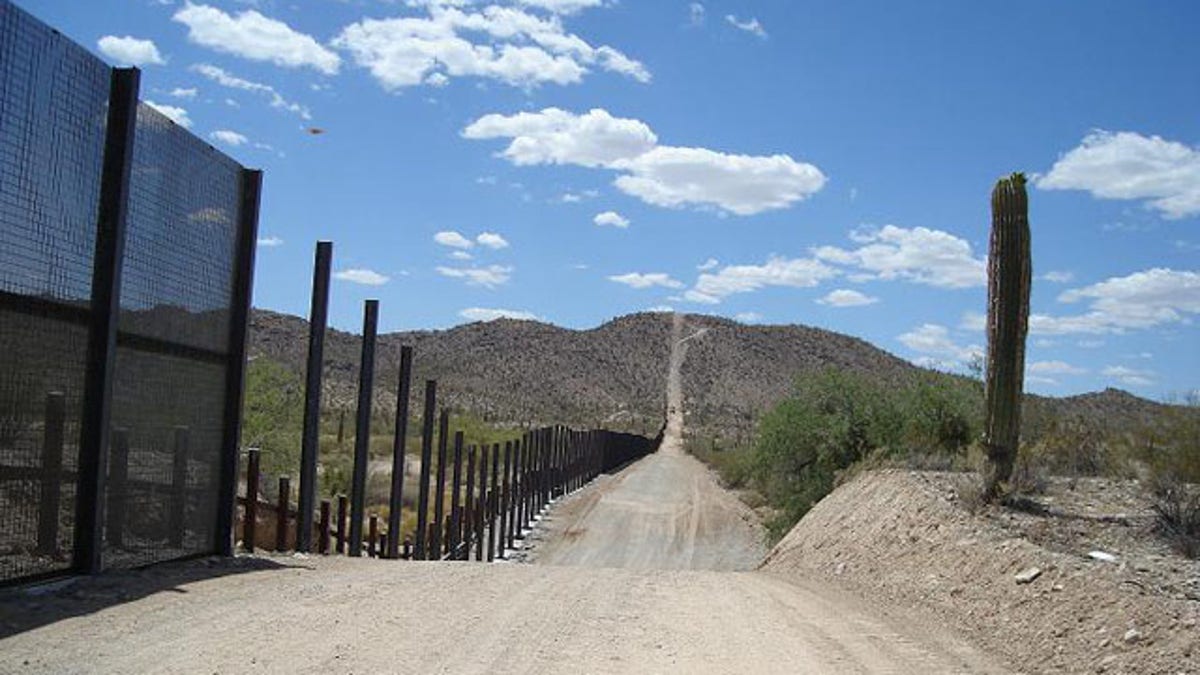
A pedestrian fence and a vehicle barrier are seen at Organ Pipe Cactus National Monument, near Lukeville, Ariz. (NPS.gov)
Imagine the federal government closing a section of the Lincoln Memorial because it was under the control of Mexican drug lords and bands of illegal immigrants.
That scenario is playing out as reality in southern Arizona, where parts of five federal lands -- including two designated national monuments -- continue to post travel warnings or be outright closed to Americans who own the land because of the dangers of "human and drug trafficking" along the Mexican border.
Roughly 3,500 acres of the Buenos Aires National Wildlife Refuge -- about 3 percent of the 118,000-acre park -- have been closed since Oct. 6, 2006, when U.S. Fish and Wildlife Service officials acknowledged a marked increase in violence along a tract of land that extends north from the border for roughly three-quarters of a mile. Federal officials say they have no plans to reopen the area.
Elsewhere, at Organ Pipe Cactus National Monument, which shares a 32-mile stretch of the border with Mexico, visitors are warned on a federally-run website that some areas are not accessible by anyone.
"Due to our proximity to the International Boundary with Mexico, some areas near the border are closed for construction and visitor safety concerns," the website reads.
On another page titled "Border Concerns," the website warns that visitors should be aware that "drug smuggling routes" pass through the park.
"If you see any activity which looks illegal, suspicious, or out of place, please do not intervene," the website reads. "Note your location. Call 911 or report it to a ranger as quickly as possible. Each year hundreds of people travel north through the park seeking to enter the United States."
Visitors are also warned to be mindful of illegal immigrants within Ironwood Forest National Monument, a 129,000-acre federal parkland in the Sonoran Desert.
"All suspected illegal activities should be reported to [the Bureau of Land Management] or local law enforcement authorities," Ironwood Forest's website reads. "Visitors should stay safe by avoiding contact with persons exhibiting suspicious behavior or engaged in dangerous activities. Drive with caution and look for fast-moving vehicles and pedestrians on back roads."
Dennis Godfrey, a spokesman for the Bureau of Land Management's Arizona office, said roughly a dozen signs were posted earlier this month along the Sonoran Desert National Monument advising that travel in the area is not recommended due to "active drug and human" smuggling. The signs are not far from where a Pinal County deputy was shot and killed during a confrontation with marijuana smugglers in April and the fatal shooting of two men suspected to be drug smugglers.
"It is a corridor for smugglers of all types," Godfrey told FoxNews.com.
Similar signs have been posted at the Cabeza Prieta National Wildlife Refuge and the Coronado National Forest, which covers nearly 1.8 million acres in southeastern Arizona and southwestern New Mexico.
Estimates of exactly how many acres of federal land are closed due to safety concerns near the border were not immediately available, but at least one lawmaker told FoxNews.com that the policy of "ceding" federal land to drug and human trafficking is unacceptable.
"This is one of those things that the Department of Interior does not want to publicize," said Rep. Rob Bishop, R-Utah, ranking Republican on the House Parks and Public Lands Subcommittee. "These bad actors are now being channeled into federal lands along the border because it's so easy to make that access. The situation is getting worse on federal lands and will only get worse until we make some proactive activity to change the status quo."
"Frankly," Bishop continued, "the status quo is failing. We are failing to control our borders."
Bishop, who has introduced legislation that would remove environmental restrictions the Department of Interior imposes on U.S. Border Patrol agents, questioned the message sent by federal authorities by closing off part of the Buenos Aires Refuge.
"That is a ludicrous message," he said. "That policy in unacceptable. That strikes of running a policy of appeasement to drug cartels instead of fighting back. Someone has to say that not one inch of American property will be given to the bad guys and not one death is acceptable."

